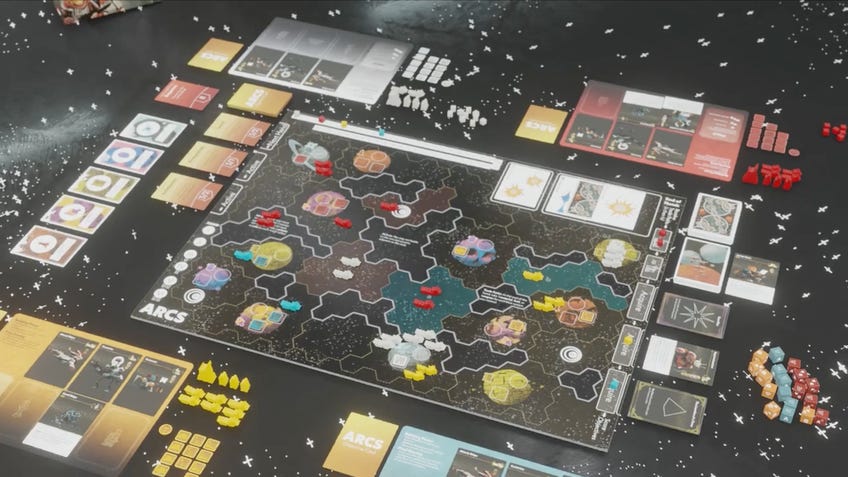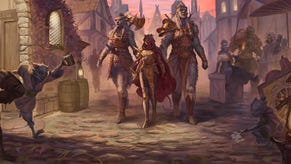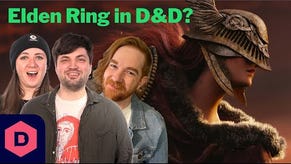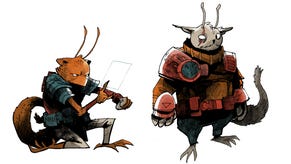Could Arcs be the first misfire from Cole Wehrle? Our impressions of Root creators’ latest board game
A galactic disappointment.
Ever since the release of Root, Cole Wehrle has become a household name in the tabletop gaming industry and community. Wehrle has gone on to design several expansions and Oath, a semi-campaign style board game that Matt couldn’t praise enough in our review.
Wehrle’s latest game is Arcs, an upcoming board game that was initially pitched as a narrative-driven tabletop title taking place in space. Since its first reveal, Arcs has had its successful Kickstarter in which the game’s campaign elements were removed from the core release and placed into a separate expansion, reportedly due to the need to provide a more affordable version.
Matt, Meehan and Chase had the chance to play this newly created core version of Arcs via a digital demo on Tabletop Simulator - here are their thoughts on this simpler version of Arcs. Watch our discussion below, or read on for the full conversation!
Matt: We all are, on different levels, Cole Wehrle fans. Or... stans? Wehrle has made some really good games and Arcs: Conflict and Collapse in the Void is his latest offering.
Chase: They've actually dropped the subheading out from their Kickstarter page and just went with Arcs.
Matt: Oh, great! That's easier to remember. We played a demo on Tabletop Simulator and we're here to talk about it briefly. We should say, up top, that when it was originally announced Arcs was going to have a narrative campaign in the box. However, the demo we played, and the base game for the Kickstarter campaign, no longer includes that narrative campaign and is just a replayable strategy game. Which I think is an important detail to know upfront.
Arcs felt fine. But fine is not what I expected from a Cole Werhle game. I expected something with a little more spark.
I would say I came away from Arcs feeling a little disappointed. Honestly, Root might be my favourite board game of all time. And I really, really like Oath, which was my favourite board game of last year, Arcs felt... fine. But fine is not what I expected from a Cole Werhle game. Frankly, I expected something with a little more spark. I expected that kind of Wehrle magic. And it wasn't there in Arcs for me. I think part of that may be the lack of narrative. There are little hints at a wider universe in the game, but the factions you're playing with aren't named. The locations and the planets on the board don't have names.
It is essentially a sci-fi strategy game that you play by making tricks with hands of cards. You have something similar to a 52-card deck, which have numbers and suits. On their turn, someone plays a card and you either have to follow that card by beating the number and matching the suit, or choose to play a card of a different suit. That card drives the actions you can do, which are fairly standard sci-fi strategy things - you build ships, you build extractors and factories, you gain resources, and then you can fight with other people. But that's kind of it. You just get points. You go through the rounds, you get some more cards and you can build some more stuff, but it didn't really feel like it went much beyond that.

Meehan: It wasn't what I was expecting. When I spoke to Cole earlier this year about Arcs, he was so excited. He could barely contain his clear excitement for making this game. He said that there were elements of it that weren't included in Oath that he'd wanted to include in this game. But it felt like the thing he was most excited about was the idea the players would affect this universe with their actions. That they would be telling a story of sorts over a three-session game. At the beginning of every session, things would be different because of the actions that players have done previously.
The interview also made it sound like you actually played as either characters or factions of some sort, that were defined by their objectives. The version that we played has objectives in it, but they feel very impersonal and kind of dry. There are objectives that everyone can see and attempt to score points with, and then there are secret objectives. Again, in this conversation with Wehrle, they sounded like a big deal in that they had potential to have you turn on other people or that they would define your journey in the game. But that's not the experience that I had. The private objectives very much felt like just another thing you can do to score points.
Often in Cole Wehrle's games, the story comes from the players’ own stories that they make by playing the game.
The game has [Root and Oath illustrator] Kyle Ferrin's artwork, which is as good as always. It also has some interesting mechanics, particularly with the trick-taking and the influence, where you can influence as an action to try and get cards at the end of every round. But, apart from that, it didn't feel like it was made by Wehrle and Ferrin. Arcs felt like an empty husk. That sounds harsh, but it's the kind of game that I would play and not think about afterwards, unless I had to. Which is not the experience I've had with playing any other Wehrle games - even the ones that I like less than Root. For example, Pax Pamir: Second Edition, which is not my favourite of Wehrle's games, even after playing that I was still thinking about it afterwards.
The blend of how Wehrle's mechanics reflect the core ideas and themes of each game - that's his whole thing as a designer. Which is why the concept of Arcs was so interesting; I felt like this is something he hadn't really done before, where he was directly putting storytelling and narrative elements into a game. Often in Wehrle's games, the story comes from the players’ own specific stories that they make by playing the game. I've actually written an article about that particular experience that you often get from Wehrle games. Whereas this felt like he was striking out and doing something different, where he was doing something more specifically narrative-based like an Eldritch Horror or Gloomhaven. But what we played was not that.
Chase: I feel like I ended up the most positive on this game, even though I do very much agree with a lot of what you've said. I wonder how much of that comes down to expectations, because I played this with the understanding that the campaign part had been excised out of it. I haven't played a game that makes trick-taking the main way you fuel an action economy of what is essentially a boiled-down 4X game - there's explore, exploit, explode and expand. They've made it this interesting quicker-paced trick-taking game where you have to follow suits and you have different actions to deviate from that. But it definitely does feel like there was a more robust Leder joint that had a lot of that world-building that narratively tied together elements, that was filed off to get it down to a $60/£40 boxed experience. When we finished playing, you could feel where it was cut off. Those edges kept nagging at me as we were playing, even though I generally enjoyed the game.
Matt: Out of everything we heard about this game leading up to it, I was most excited about that narrative part. Oath is a campaign game and the campaign part of that game is really interesting. There are those little narrative threads; the locations that have names, and you're dealing with roles like the chancellor. Or there's the interesting player dynamics of Root. Obviously, everyone's playing a different game in Root, but the way they clash in the middle makes it really interesting. I think the trick-taking in Arcs is a good mechanic, but it feels like a mechanic that doesn't have the flesh around those bones to actually just keep me invested in it. It's a really cool thing by itself. But it's not enough.
When we finished playing, you could feel where it was cut off. Those edges kept nagging at me as we were playing, even though I generally enjoyed the game.
Meehan: It felt empty. It was definitely lacking something. I don't know the specifics with the financial elements, but how much extra would those narrative elements cost? Was it some extra cards or an extra or larger rulebook? It's not like they took miniatures out. I imagine that the quality components that Leder Games often have, such as the little wooden pieces and things like that, are in the core version. That's the thing that costs the most money. Maybe there are other components involved with the campaign that were costly, but I genuinely don't know how the campaign made it that much more expensive. Unless they just were looking for another way to make an extra bit of money.
Matt: I feel like Leder Games has a fairly good track record in that regard. I feel like they are one of the less cynical companies.
Meehan: So why have they done this? Because I think it is a reality of Kickstarter games these days. For example, having cards printed in bulk is actually more cost-effective than having fewer cards printed. So, if it's cards that makes up this expansion, I don't know where the extra expense is coming from, unless it’s components?
Chase: I need to double-check. But I believe in an article or blog post that Wehrle did after the Kickstarter came out or right around that time, he explained that it wasn't so much of a cost issue, but more that they wanted to reach another point of market saturation. Getting a cheaper box out there so that people could get a Leder Game without having to go in for the full Oath price range. I think he even said that Oath sold well, but did not sell nearly as well as Root did and he largely believes that it's because the box was so big and so expensive. With Arcs they were looking to create this boiled-down experience that people could use as a sort of bridge into Leder Games' portfolio.
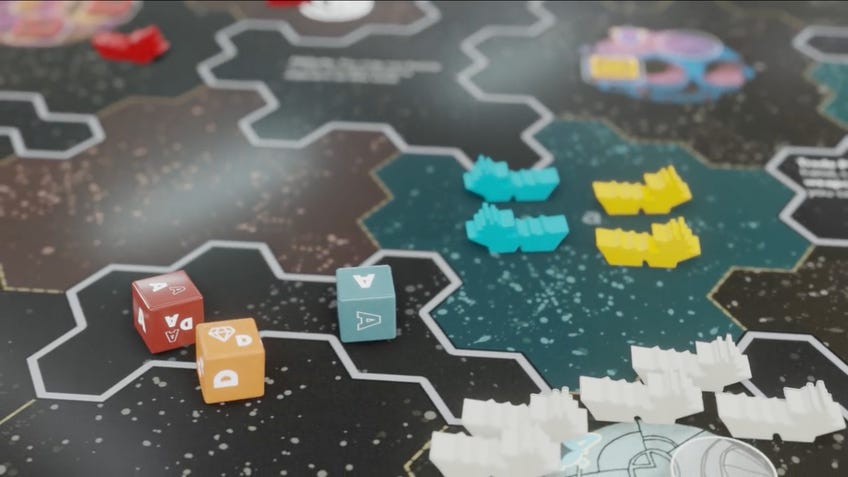
Meehan: I'm gonna say something a bit controversial. I would rather they compromised on the quality of the pieces and included the campaign elements in Arcs, instead of separating it out to make a cheaper production.
Matt: I get that there's the level of accessibility and approachability to having a cheaper box, but I feel like if someone came to this as their first Leder Game and their first Wehrle game, I don't think they would be enraptured in the way that I think we all were by Root, Pax Pamir and Oath. That feels like a real shame. Potentially it's the reality of the market hitting. Leder has been fairly upfront with it all, but it does just feel like a real loss to, I would say, one of the most prominent designers who has real vision. It does just feel like something's been lost.
Meehan: I really loved another Leder Game called Fort. It's not nearly as complex as your average Cole Wehrle game. But it's still really good. I would rather play Fort any day over Arcs because Fort feels like a whole and complete thing. When you take the intended design of Arcs and you alter it like this, I just think that you're genuinely providing a worse experience. I would rather say to them, “Okay, is the wood expensive?” For example, if the components of Arcs are made out of wood like they often are in Leder games, would it be cheaper to make them plastic? Is it cheaper to do cardboard?
Obviously, it's lovely having that high-quality experience. Pax Pamir: Second Edition is not a cheap game, but you pay for the lovely fabric board and the little wooden pieces. Your average board game player is probably not going to pay out for something like that. But if they could have made Arcs cheaper by using cheaper components, I would rather they have done that and kept the game as it was meant to be. As Chase said, it feels like they they've literally sliced something out of this game and then put it aside. I think an accurate analogy would be like if Arcs was a three-tiered cake and one of each of the tiers was a different flavour. It's like they've taken one of the tiers out and just plopped it on the side. But it's not gonna work without that tier, because that's part of its flavour profile.
Chase: It's a shame because I feel like we had a lot of really good interactions within the game we played. There were times where Matt all of a sudden bulked up and moved into my territory and we had a fun little scuffle in one of the systems. But then, on the next turn, I got some lucky dice rolls and decimated his ships so that he turned tail and fled. That was really cool because then it changed where both of us were in terms of our positioning within the galaxy. All the while, Alex was out there just sort of building resources and moving through a void zone to come out into Matt's territory. That was all because of the way the cards played out. I think Wehrle has even said in in one of his designer blogs about making the best of a bad situation where you get all cards and none of them seem to be working. That's a cool design.
Meehan: I wish I could take the trick-taking mechanic and put it in another game.
Matt: That's exactly where I'm at. I really liked the trick-taking. We had those little moments of trying to decide whether we're going to burn this card to do the action we need to do or whether to save it in the hope that we could use it for trick-taking later on to get more out of it. That's a really interesting dynamic. But what's happening on the board a lot of the time is not enough. We had those fights but nothing really came of it. It's not like in Oath where you're trying to overthrow the chancellor. That's your constant objective. It's just getting points.
I wish I could take the trick-taking mechanic and put it in another game.
Meehan: With Oath it's got that kind of interpersonal element. The fact that you can make alliances, for example. Obviously there's the mechanics with the cards and the board and things like that. But the appeal of Oath are those player interactions. I just didn't feel like Arcs had any of that, because ultimately what you're doing is you're trying to score for these objectives.
Chase: If Leder is trying to set up Arcs to be this standalone game to provide a bridge to new players, it's just such a shadow of a lot of their other games with the way it is right now. It feels like they diluted it down too much. I'd almost tell someone if you want to bridge into Leder games, just cough up a little bit of extra money to buy Root cause that's such a stronger sales pitch than Arcs.
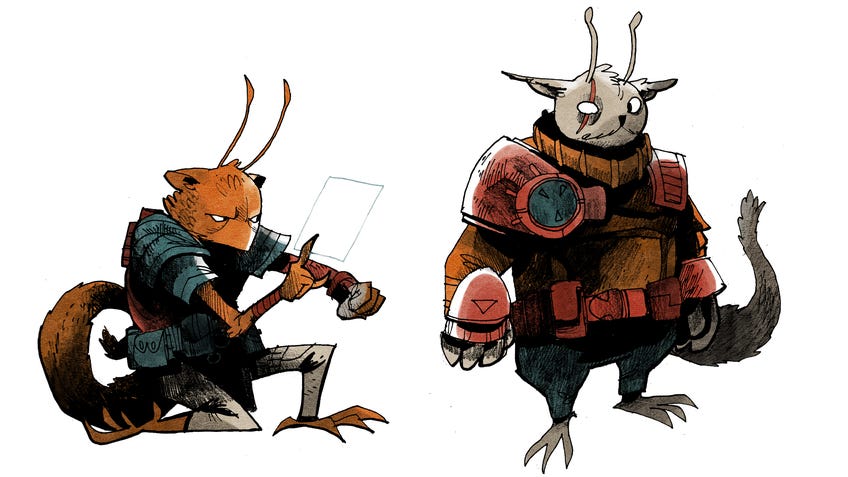
Meehan: I mean, ultimately if you want to play a Cole Wehrle game, it's not probably not going to be that straightforward. Unfortunately, you're just gonna have to play it until you learn it. I would be interested to see whether the narrative elements that have been taken out of Arc, if they were put back in, whether it would make Arcs a good game? Is it actually a mediocre game at its core?
Matt: That's where I'm at as well. I want to give it a shot. I didn't not enjoy my time with it. But every other Wehrle game I've played I just want to play more of. I want to learn its mechanics and really get invested. But I didn't feel that with Arcs. I do want to go back to it to see if that expansion does bring that magic because, at the moment, it is just missing that spark for me. But I think it feels like we're kind of on similar pages, albeit, with varying degrees of temperature about this. Is it unfair to say that this might be the first slight misfire from Wehrle and Leder Games?
Meehan: I mean, it's not the first misfire from Leder Games by any stretch of the imagination. But for me, it's a big old disappointment because I was excited about this game. Number one, it's a Cole Wehrle game and, number two, Wehrle was really excited about it. But this just didn't live up to those expectations.
Chase: I think that Leder Games and Wehrle should have the space to make a fine game. It's unreasonable to expect him to hit it out of the park every time. But I think Matt you said it best when you came in swinging, damning with faint praise by saying that it's fine.
Matt: Yeah, it's an OK game. It's a disappointing Cole Wehrle game. We'll hopefully find out more when we actually get a chance to play that expansion as well.
